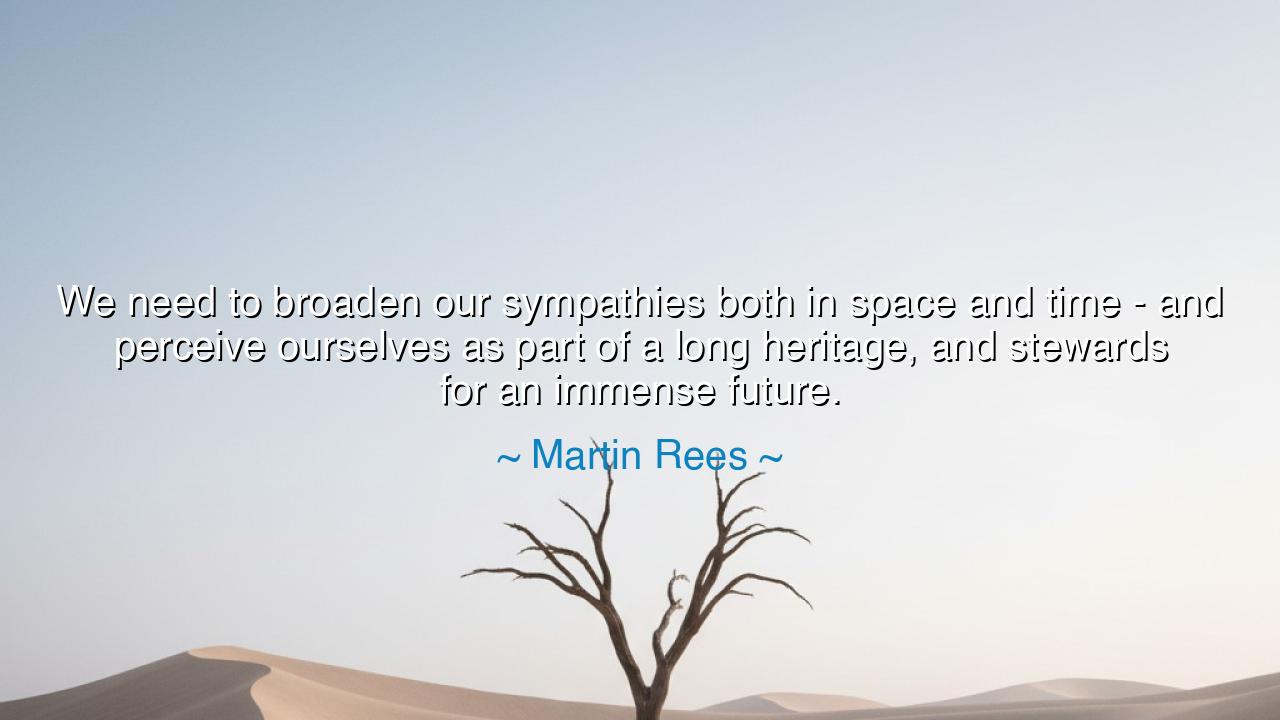
We need to broaden our sympathies both in space and time - and
We need to broaden our sympathies both in space and time - and perceive ourselves as part of a long heritage, and stewards for an immense future.






When Martin Rees declared, “We need to broaden our sympathies both in space and time – and perceive ourselves as part of a long heritage, and stewards for an immense future,” he was not merely speaking as a scientist, but as a sage of the human race. His words carry the weight of millennia, urging us to see beyond the narrow circle of our own days, beyond the small boundaries of our own tribes, and to recognize that we stand in a chain stretching back into the deep past and forward into a future vaster than we can imagine. To broaden our sympathies is to awaken the heart from its smallness and let it embrace all who came before us and all who will follow after us.
The origin of this wisdom lies in humanity’s long struggle with time. Ancient peoples lived bound to the cycles of the seasons, caring for ancestors through ritual, and planting trees whose shade they would never sit beneath. They understood, in their own way, that man is not a creature of the moment, but a vessel carrying both the heritage of the past and the hopes of the future. Rees, standing in the modern age of science and cosmology, reminds us of this ancient truth with new clarity: that to live rightly, we must think not in years, but in centuries; not only of ourselves, but of generations unborn.
History gives us clear lessons in this. Consider the builders of the Great Cathedrals of Europe, who laid foundations they would never see completed, knowing the spires would rise long after they had turned to dust. They saw themselves not as solitary workers but as part of a vast unfolding story, entrusted with shaping a world for those yet to come. Their stones still stand as testimony to the truth Rees speaks: that we are stewards, not owners, of the future.
Rees’s call to broaden sympathy “in space” is also heroic. It is not enough to care only for those near to us—our family, our town, our nation. The modern world binds us together, whether through the shared breath of the atmosphere, the spread of technology, or the fragile balance of nature. A famine in one land, a war in another, an invention in a far-off country—these affect us all. To live in this age is to learn to widen the circle of compassion, to recognize that the fate of strangers, and even of distant ecosystems, is bound up with our own.
The meaning of his words is therefore double-edged: we are heirs, and we are guardians. We inherit the wisdom, art, and toil of countless generations, but we are also charged with passing on the earth, its knowledge, and its beauty to those yet unborn. To forget the first is arrogance, to forget the second is betrayal. To remember both is to live as part of the great human story, rather than as a fleeting shadow.
The lesson for us is clear: live with a horizon that stretches far beyond yourself. In your choices, ask not only, What serves me now? but also, What honors those who came before me, and what serves those who will follow after? Plant trees, preserve knowledge, nurture peace, protect the earth—these are acts of true stewardship. Just as we honor the ancestors who gave us language, science, and art, so too must we labor for descendants who will never know our names.
What, then, should you do in daily life? First, cultivate awareness of heritage—study history, remember those who struggled before you, and see yourself as a continuation of their story. Second, act with foresight: let your decisions reflect not only the present but the immense future. Reduce waste, support education, defend justice, create works that endure. Third, widen your sympathies outward: care not only for those close to you, but also for distant peoples, for the planet, for life itself.
Thus, let Martin Rees’s words stand as both reminder and summons: “Broaden your sympathies in space and time.” For to live only for the present is to live small, but to live as heir and steward is to live greatly. Remember always: you are a child of the past, a parent of the future, and a guardian of the vast human journey that stretches across the ages. To carry this awareness is to live not as a moment, but as a legacy.






AAdministratorAdministrator
Welcome, honored guests. Please leave a comment, we will respond soon